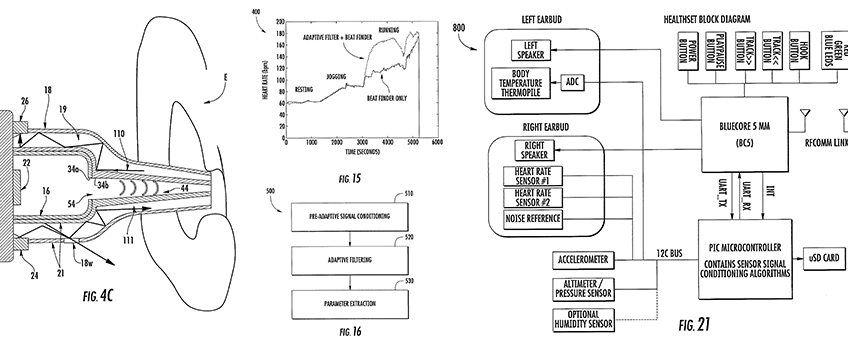
Fitbit v Valencell
Fitbit, Inc. v. Valencell, Inc.
No. 2019-1048 Fed. Cir. Before Circuit Judges Newman, Dyk, and Reyna.
Apple petitioned the Board for IPR of claims 1–13. The Board denied review of claims 3–5. Fitbit filed an IPR petition for claims 1, 2, and 6–13 and moved for joinder with Apple’s IPR, which the Board granted. After the PTAB trial, but before the Final Written Decision, the Supreme Court decided SAS Institute, Inc. v. Iancu, 138 S. Ct. 1348 (2018), holding that the America Invents Act requires that all challenged claims must be reviewed by the Board if the IPR petition is granted. The Board re-instituted the IPR to add claims 3–5 of the patent. The Final Written Decision held claims 1, 2, and 6–13 unpatentable, and held claims 3–5 not unpatentable. Following the decision, Apple withdrew from the proceeding.
Fitbit appealed the Board’s decision on claims 3–5. Valencell challenged Fitbit’s right to appeal. Valencell argued that Fitbit was not a “party” for purposes of appeal because it did not request review of claims 3–5 in its initial IPR petition, did not request leave to amend its petition after the Supreme Court’s decision in SAS Institute, and did not submit a separate brief with respect to claims 3–5. Valencell also argued that Fitbit was not a full participant, because the Board stated that Fitbit would have “limited participation, if at all, and required Fitbit to seek authorization from the Board before filing any papers.” The Court concluded that rights as a joined party apply to the entirety of the proceedings and include the right to appeal.
Claim 3 made reference to an “application-specific interface (API).” The Board adopted a narrower construction of the term than Fitbit had proposed. The Court agreed with the Board’s construction of the term. However, after construing that term, the Board did not review the patentability of claim 3 on the asserted grounds of obviousness. The Court remanded for further review of patentability.
The Board held claims 4 and 5 not unpatentable in its Final Written Decision because it could not determine the meaning of the claims. The term “the application” in the claims lacked antecedent basis. The parties agreed on the correct antecedent, but the Board declined to accept the parties’ shared view. The Court stated that “[t]he concept of error correction is not new to the Agency, which is authorized to issue Certificates of Correction.” The Court found that the Board’s decision was “not a reasonable resolution, and does not comport with the Agency’s assignment to resolve patentability issues. On the correct antecedent basis, the petition’s issue of obviousness may be resolved by the Board, in furtherance of resolution of the parties’ dispute in concurrent district court litigation.”
Read more: Federal Bar member attorneys may access the full case summary by registered patent attorney B.C. “Bill” Killough in the July 2020 issue of Federal Circuit Case Digest
 B.C. Killough is a registered patent attorney based in Charleston, SC. On behalf of his clients, Bill has obtained more than 300 United States patents, participated in prosecuting more than 100 foreign patent applications and he has filed more than 1000 trademark applications with the US Patent and Trademark Offices.
B.C. Killough is a registered patent attorney based in Charleston, SC. On behalf of his clients, Bill has obtained more than 300 United States patents, participated in prosecuting more than 100 foreign patent applications and he has filed more than 1000 trademark applications with the US Patent and Trademark Offices.